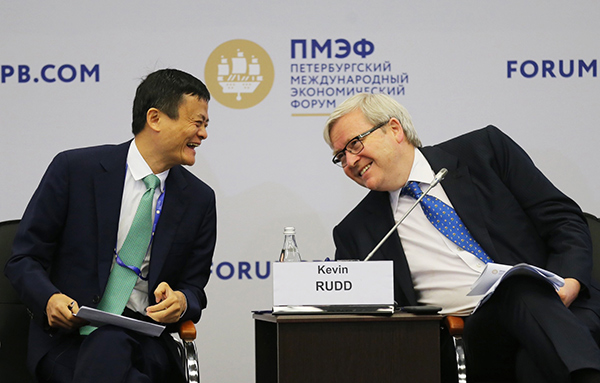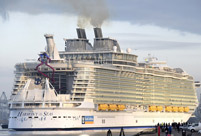


Jack Ma, chairman of Alibaba Group, talks with Kevin Michael Rudd, president of the Asia Society Policy Institute and former prime minister of Australia, at the St Petersburg International Economic Forum that opened on June 16, 2016. [Xu Jingxing/China Daily]
Jack Ma, founder and chairman of e-commerce giant Alibaba Group Holding Ltd, on Thursday proposed the establishment of digital free trade zones for small businesses and called for Russia to become an e-hub intersection connecting Asia and Europe.
An e-hub is a digital free trade zone designed specifically for small businesses. Ma said services including logistics, payments, financing and inspections would be provided.
"Trains have stations and aircraft have airports. We should build an e-road that connects e-hubs around the world. It would be a paradise for SMEs to sell products that serve anywhere in the world," Ma said.
"Russia has very good chance to be one of the e-hubs," Ma said.
Ma made his remarks at the St. Petersburg International Economic Forum that opened on Thursday and runs to Saturday.
The three-day forum is an annual international conference dedicated to the most pressing economic and business issues facing Russia and the world.
Ma's proposal is part of his ambition, raised last year, to build a global e-commerce platform, called the Electronic World Trade Platform. It would serve the interests of SMEs that have been left out of the world's free trade regime in the past.
"In most countries SMEs contribute more than 50 percent of GDP and an even higher percentage of employment. But SMEs face challenges such as poor access to global markets, complex regulations and certifications designed for big companies, and a lack of access to financing," Ma said.
"We urge G20 countries to support the growth of SMEs," said Ma, who is also the chair of the B20 SME Development Taskforce. B20 is the business advisory group to the G20.
Cross-border shopping is the fastest-growing sector in Russia's e-commerce market. Ma said in an interview in 2015 that about one in 10 people from Russia made online purchases through Alibaba's AliExpress, a site that allows shoppers around the world to buy goods at wholesale prices.
"Hundreds of thousands" of packages are sent from China to Russia on a daily basis, according to the e-commerce giant.
China has been Russia's largest trading partner for six consecutive years since 2010. But Sino-Russian bilateral trade volume fell 27.8 percent last year to 422.73 billion yuan ($64.16 billion) due to the ongoing global economic downturn and falling oil prices, according to the General Administration of Customs.
"Besides energy industry cooperation, companies from both countries should work together to jointly develop high-end products for the manufacturing, consumption and infrastructure sectors," Chen Yuan, vice-chairman of the National Committee of the Chinese People's Political Consultative Conference, said at the forum.
"Such a partnership will create huge opportunities for trade and financial cooperation. I am confident that our bilateral trade volume will reach $200 billion by 2020," Chen said.
The trade target was first raised by the leaders of both countries in 2014.
 Five made-in-China hi-tech breakthroughs
Five made-in-China hi-tech breakthroughs Beijing Style: Hot pants
Beijing Style: Hot pants HK-Zhuhai-Macao Bridge to open to traffic
HK-Zhuhai-Macao Bridge to open to traffic China opens its first combined transport service to Nepal
China opens its first combined transport service to Nepal Students take stylish bikini graduations photos
Students take stylish bikini graduations photos Charming dancing students pose for graduation photos
Charming dancing students pose for graduation photos Guizhou, Yunnan section of Shanghai-Kunming railway connected
Guizhou, Yunnan section of Shanghai-Kunming railway connected Naked models transformed into landscapes, birds and even DRAGONS by body painting artist
Naked models transformed into landscapes, birds and even DRAGONS by body painting artist World’s biggest cruise ship Harmony of the Seas to start maiden voyage
World’s biggest cruise ship Harmony of the Seas to start maiden voyage Top 20 hottest women in the world in 2014
Top 20 hottest women in the world in 2014 Top 10 hardest languages to learn
Top 10 hardest languages to learn 10 Chinese female stars with most beautiful faces
10 Chinese female stars with most beautiful faces China’s Top 10 Unique Bridges, Highways and Roads
China’s Top 10 Unique Bridges, Highways and Roads Abortive careers
Abortive careers West traps itself by politicizing lone wolf
West traps itself by politicizing lone wolf Lenders threaten borrowers with nude pics
Lenders threaten borrowers with nude pics Local dog meat festival shouldn’t be canceled forcefully
Local dog meat festival shouldn’t be canceled forcefullyDay|Week